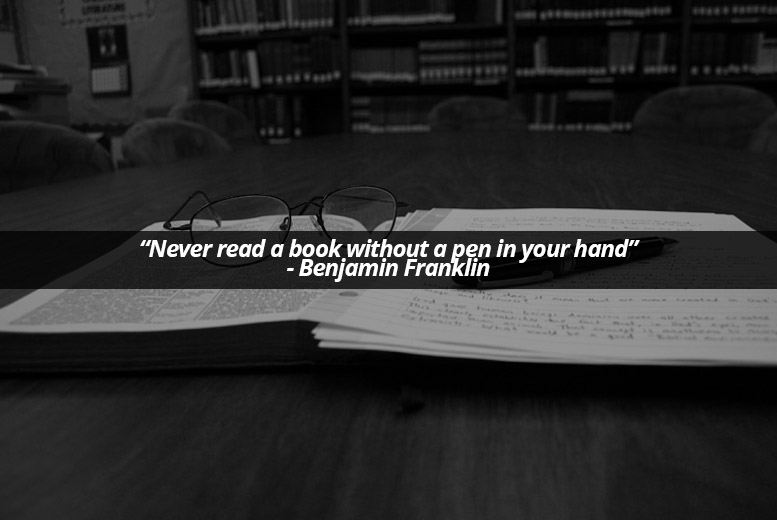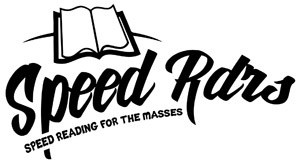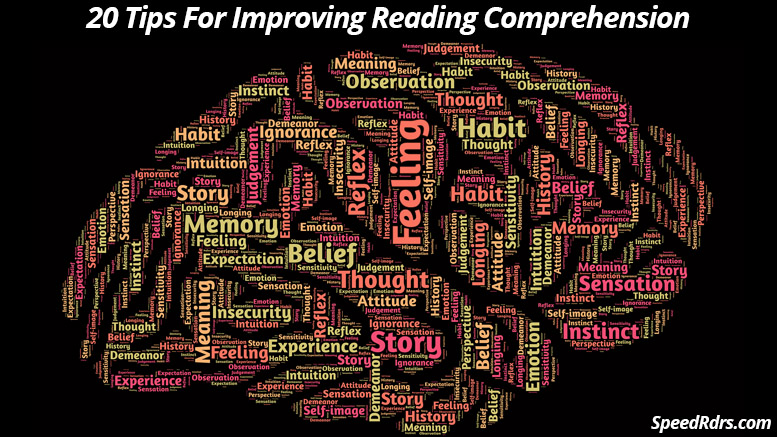Whether you’re reading a book to learn a new hobby or reading for enjoyment, being able to comprehend and remember what you read is important.
Years ago when I did not read often, I attended a book club meeting because I heard one of the books they were going to be talking about was one of my favorite books – Snow Crash by Neal Stephenson. I’ve owned the book for a long time and I’ve read most of the way through; I thought I could hold my own in the meeting.
Oh was I wrong!
They went over characters that appeared briefly throughout the plot and talked about whole sections I had no recollection of even reading! Well needless to say I felt somewhat uncomfortable there and felt like I was lying when I said I read the book.
Have you ever tried to recommend a book to a friend or family member? Did they ask the dreaded “what is the book about?” and you could not remember much of the story? We’ve all been there.
If you use these 20 tips to improve your reading comprehension, you’ll be able to soak up more information and actually use it. You will be able to recommend a book and know what it is about without having to pull out your phone.
20 Tips For Improving Reading Comprehension
These tips are in no particular order, although I did try to make them flow nicely.
1.) Pre-Read the Book
Pre-reading a book is a good time for you to try out some of your speed reading skills you’ve been practicing and look through the book and try to spot any words or topics that may interrupt your reading later. Look for words you do not understand and topics that you don’t have a firm grasp on.
How many times have you been reading a book only to stop dead in your tracks trying to figure out what a word meant? If you spend a bit of your time glancing over the majority of the words looking for things you may have to look up, it will speed up your reading later and improve your focus and ability to comprehend what you are reading.
2.) Skim the Book
Skimming the book is similar to pre-reading except you are looking more closely at the structure of the book. This includes topics, main ideas, and areas of the book that you may or may not want to read. For instance if you are reading a book about how to improve your strength training and you see a section on nutrition, you may choose to skip that section.
This applies mostly to non-fiction and technical books that you may be reading to learn a specific piece of information. Trust me, if you are trying to learn how to weld and you read a book that goes over welding, the types of welders, different metals, and gear – you’ll never remember and comprehend what you came to read.
Skimming the book is a way for you to become familiar with what’s to come. This will make it easier to transition between sections.
3.) Pay Attention to Summary Words
Phrases like “in short” or “furthermore” are summary words that indicate the author ending an argument.
Whether you are pre-reading the book or come across it while regularly reading, take the time to stop and make sure you know what the argument or point the author was trying to make prior to this.
The more you are able to pick up on these words and give yourself a “mental check” whether or not you’ve been comprehending what you’ve read, the better you are going to get at it.
In short, being able to recall what the author talks about is important if you want to comprehend what they are writing.
4.) Start with Books Your Level
Lets face it, some of us may not have cracked open a book in many years. If you read articles online, magazines, or the newspaper, cracking open a technical book or a novel may really humble you.
Choosing a book closer to the level of your reading and comprehension may be one of the most important things you can do for yourself and your ego. If the author uses words that aren’t in your vocabulary or writes deeply about a technical topic, you are not going to retain much information.
I’m not saying to start reading children’s books to get used to reading again, but I wouldn’t suggest picking up something that is above your reading level.
Just like in baseball, you probably started off playing tee-ball. The most important thing is that you pick up a book and start reading it, regardless of your skill level.
5.) Circle, Underline, or Highlight
If you own the book you are about to read, highlighting words, phrases, and sections will help improve your comprehension. This works particularly well for technical or non-fiction books that have phrases, words, and sections you want to focus on.
While you are pre-reading and skimming, feel free to mark areas that draw your attention so you know to put extra focus on those sections later.
Please don’t mark in books that you do not own; I regularly buy books with markings and it can be disappointing and distracting.
6.) Improve Your Vocabulary
Tying in with pre-reading and highlighting in your book, improving your vocabulary will do wonders for comprehension. I will admit that there are a lot of words that if not used in context I would not be able to tell you what it means; we all have to improve.
Being able to fully understand a word will make whatever the author writes stick.
There are a few tips I’ve picked up over the years to increase my vocabulary:
- Read more – This is an easy way to improve your vocabulary.
- Use an app – There are countless “Word of the Day” apps out there that will teach you the meaning of a random word.
- Crossword puzzles – My grandma does them still and she breaks out her dictionary to learn words she doesn’t know… It can be fun too!
7.) Take Notes
Taking notes is a great way to improve reading comprehension. Adding another action (such as reading out loud or taking notes) helps solidify what you are reading.

8.) Read the Whole Section Before Taking Notes or Highlighting
If you start highlighting or taking notes, you may be jumping the gun. By this, I mean you should read the whole paragraph or section before you start writing down or highlighting something interesting; it may not even be pertinent to your goal you want to accomplish.
I wish I had known how to take notes from my reading a bit more efficiently when I was in school because it seemed as if I was rewriting the book instead of making concise notes of what I just read. Reading the whole section and analyzing what you just read will help you create better notes.
Think of note taking like sending a tweet on Twitter – Make it concise and helpful as you can.
9.) Re-Read
After you’ve finished, your book will be highlighted, you’ve learned new vocabulary and you have notes at your disposal; time to re-read to concrete any topics that you aren’t 100% clear on.
You don’t have to re-read your book before you start on another one – instead, you can speed read the highlighted parts later on and help solidify the information.
It is true, repetition is the key to learning.
10.) Read Out Loud
I’ve heard there are studies on this and I haven’t looked… but I know reading out loud works and helps with improving reading comprehension.
When you read out loud, you are able to add inflection and add another sense to your reading. My tip is to only read sections that you really like or parts that you may want to remember more than others. A great tip is to read out loud what you’ve highlighted or plan to highlight.
11.) Draw From Prior Experiences
Being able to apply what you already know to what you are trying to learn is paramount if you want to be successful at comprehending what you are reading. Even if you are reading a foreign topic, you should try to figure out a way to draw from prior experience or knowledge and try to figure out a way to relate them.
Being able to apply what I’ve learned before to something I’m learning now has been the best thing I’ve ever picked up. I use this technique daily to learn new subjects or topics and it makes it painless.
12.) Read Actively; Try to Make Predictions on What’s to Come
How many times have you been either in a class or had somebody teach you something and you sat there listening simply taking notes?
While I am a proponent of note-taking, being passive in your reading keeps you from learning everything you can.
How many times have you seen a teacher going over a new topic stop and ask the class what they thought the answer or conclusion may be? They are trying to get the students to try to make a prediction of what’s to come.
Putting yourself into an active mode when you read will solidify information and help you apply it to your current knowledge.
13.) Thinking or Explaining What You Just Read
Being able to explain what you just read is a tell-tale sign that you are actually comprehending what you are reading.
Thinking out loud or trying to explain what you just read (even if it is to yourself) makes a huge difference in comprehension
I usually read out loud sections I like while actively trying to figure out what’s next and then I act like I am trying to record a YouTube video about it.
14.) Create a Goal of What You Want to Accomplish
This mostly applies to non-fiction books but you need to create a goal or purpose for reading the book. Are you looking to learn a specific topic or subject?
Come up with the reason you are reading the book so that you can then pre-read and skim accordingly. There’s no reason to read a huge book if you are only trying to learn a small portion of it.
As for fiction books, sit back and enjoy the story.
15.) Read Different Types of Text Differently
I haven’t touched on this subject much but I find speed reading works best with non-fiction technical books. You can speed read fiction books by silencing your subvocalization and learning to widen your focus but to read at the fastest pace, you will need to skim and skip some non-relevant words.
Be aware that different types of text require different types of reading and you will start to find what works best for you.
16.) Practice
Practice makes perfect. Period.
Seriously though if your reading and comprehension is a little bit rusty, don’t get discouraged. If I take some time off from reading I see that my speed has decreased and I sometimes have to re-read a section to fully grasp the concept.
The more you practice these different tips to find what works best for you, the better. You may find that you like to use a pencil to underline topics versus someone else using a highlighter.
Try everything out and see what works best; you won’t figure it out until you practice.
17.) Read Often
As I said above, if I take time off from reading regularly I can tell a difference. The more frequently you can pick up a book to read, the better.
Once you start making it a habit to read fairly often, you’ll notice your speed and reading comprehension increase.
I try to keep a book in every room I am in so that if I have downtime I can read.
18.) Monitor Your Understanding
Take time to stop while you are reading to monitor how much you are understanding and how much you are glossing over. If you notice yourself starting to gloss over more than you would like, change things up a bit and try another tactic. For instance, read out loud a whole section and then go back and take notes instead of just the important parts.
This will help put your mind back into learn mode and keep it out of “auto pilot” mode.
19.) Eliminate Distractions
Everywhere you look has at least 3 distractions in your view – Computers, phones, tablets, television, you name it.
Getting into a super-focused mindset or “flow-state” will help you achieve the best reading and comprehension you’ll ever have.
Sometimes when the weather is nice I like to leave all of the distractions in the house and go read out on the porch; it is relaxing and helps me focus on what I’d like to do.
20.) Try the SQ3R System
The SQ3R system is something I came across recently that explains how I used to tackle my textbooks in school. It did quite well for me and I wanted to share it with you.
SQ3R stands for:
- Survey
- Question
- Read
- Recite
- Review
Check out this article from Saint Louis University that breaks it down for you:
Conclusion
These 20 tips aren’t ground breaking and they surely aren’t secret… but they work.
I’ve been that person that couldn’t make it through 10 pages without becoming bored, tired, and wanting to put the book down.
I use these tips to learn new topics and read every day, there is no fancy gimmick to this.
From getting away from distractions to writing notes, this list should give you plenty of new things to try next time you pick up a book.
Looking to improve your time management skills? Check out these 9 Books to Improve Your Time Management that I recommend.
If you have any questions or comments, leave them below and be sure to subscribe to our newsletter for updates and special offers!


Be the first to comment on "20 Tips For Improving Reading Comprehension"